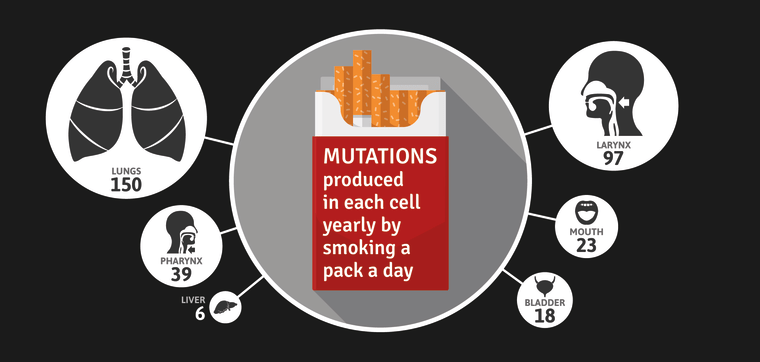Smoking is so deadly that it may be more likely to kill HIV patients than the virus, researchers reported Thursday.
A second study helps explain why -- it causes dozens of cancer-causing DNA mutations.
New cocktails of HIV drugs can keep patients healthy, even though they don't cure the infection. And they work so well that HIV patients who can get the drugs have almost the same life expectancy as uninfected Americans.

The trouble is, 40 percent of HIV patients smoke — more than twice the rate of U.S. adults as a whole.
Dr. Krishna Reddy of Massachusetts General Hospital and Harvard Medical School and colleagues wanted to see which was worse — smoking or HIV. They used a computer projection to calculate the odds.
Smoking is worse, they report in the Journal of Infectious Diseases. On average, smoking cuts six years from the life expectancy of an otherwise healthy 40-year-old with well-controlled HIV, they found.
"It is well known that smoking is bad for health, but we demonstrate in this study just how bad it is," Reddy said in a statement.
Related: Here's How Smoking Scars Your DNA
"We actually quantify the risk, and I think providing those numbers to patients can help put their own risks from smoking in perspective. A person with HIV who consistently takes HIV medicines but smokes is much more likely to die of a smoking-related disease than of HIV itself."
A smoker starting HIV treatment at age 40 can expect to live to be 65 if he's a man and 68 if she's a woman, they found. Former smokers could expect to live to almost 71 — 73 for women — and people who never smoked could expect to live to be 72 for men and 64 for women.
"A person with HIV who consistently takes HIV medicines but smokes is much more likely to die of a smoking-related disease than of HIV itself."
"We show that even people who have been smoking till age 60 but quit at age 60 have a substantial increase in their life expectancy compared to those who continue to smoke, so it's never too late to quit," Reddy said.
In a second study, an international team of researchers found a batch of genetic mutations caused by smoking — mutations that could be expected to cause cancer.
They examined tumors from 10 cancer types known to be caused by smoking, taken from 5,000 cancer patients, both smokers and non-smokers. They found five different mutational "signatures" in the smokers, they reported in the journal Science.
Cancer is a disease caused by DNA damage, and the team, including Ludmil Alexandrov of Los Alamos National Laboratory and Mike Stratton of Britain's Wellcome Trust Sanger Institute, found a lot of damage. Lung cells accumulated 150 different mutations for each year of smoking, they found.
Throat cells did, also — larynx cells on average undergo 97 new mutations in a year of smoking, and pharynx cells get 39. The team found 18 new mutations in bladder cells.
"Our research indicates that the way tobacco smoking causes cancer is more complex than we thought," Stratton said in a statement.
Smoking is the biggest cause of preventable illness, killing more than 480,000 Americans every year, according to the Centers for Disease Control and Prevention.
Globally, it kills about 6 million people a year through cancer, heart disease, lung disease and other illnesses.
Smoking rates have plummeted in the United States, and now only about 15 percent of U.S. adults smoke — and just 11 percent of high school students smoke.

